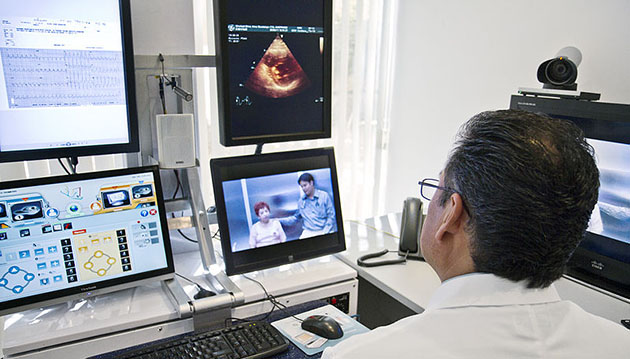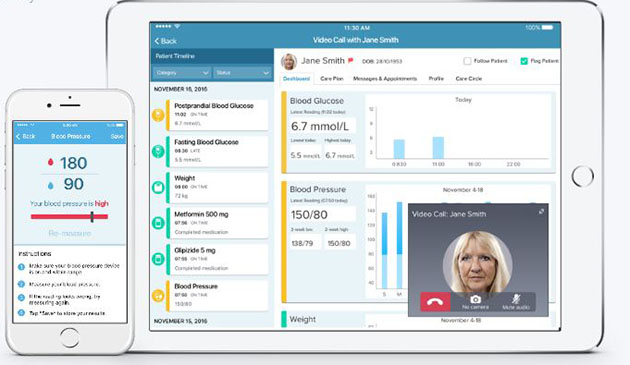By The Life Science Report
Source: Streetwise Reports 10/05/2017
The rapid increase in the incidence of chronic diseases and the need to reduce healthcare costs have led to the growth in telemedicine, which has companies racing to bring new products to market.

Telemedicine lies in the forefront of innovation for the healthcare industry. Using a combination of telecommunications and technology, healthcare can be provided from a distance, providing essential coverage to people in rural communities, among others, who may not have ready access to medical facilities.
Monitoring is especially important to people with chronic diseases such as diabetes, congestive heart failure and COPD, who without regular follow-up may experience life threatening conditions that necessitate expensive emergency room visits and hospital admissions.
The global telemedicine market, Grand View Research noted in a report released in April, is expected to reach US$113 billion by 2025, up from US$24.9 billion in 2016, a compound annual growth rate of 18%. The research firm stated that the key drivers are the increasing numbers of chronic conditions and the rising demand for self-care. The “enhancing application of Internet, virtual medicine and rising demand for centralization of healthcare are expected to save on cost incurred, which is one of the critical success factors attributing for the growth of telemedicine market,” research firm noted.
Free Reports:
 Get Our Free Metatrader 4 Indicators - Put Our Free MetaTrader 4 Custom Indicators on your charts when you join our Weekly Newsletter
Get Our Free Metatrader 4 Indicators - Put Our Free MetaTrader 4 Custom Indicators on your charts when you join our Weekly Newsletter
 Get our Weekly Commitment of Traders Reports - See where the biggest traders (Hedge Funds and Commercial Hedgers) are positioned in the futures markets on a weekly basis.
Get our Weekly Commitment of Traders Reports - See where the biggest traders (Hedge Funds and Commercial Hedgers) are positioned in the futures markets on a weekly basis.
A recent KPMG-commissioned survey found that about one-third of healthcare providers are using patient monitoring and video services “to improve patient engagement and access to care and more of these programs are likely to come.” While the study conducted by HIMSS Analytics found 31% of healthcare organizations were using video-based services and 34% provided remote monitoring, growth is foreseen as an additional 44% expect to add video-based services and 48% are planning for remote monitoring.
There is growing acceptance of telemedicine. A recent Harris Poll survey found that 65% of consumers who had a primary care physician said they were open to seeing their doctor by video. Among parents with children under age 18, over three-quarters, 78%, expressed interest.
One system at the forefront of telemedicine is Banner Health. The Phoenix-based healthcare system operates 28 hospitals and is piloting an in-home Intensive Ambulatory Care (IAC) telehealth program. The program enrolled some of the system’s most complex patients, people with five or more chronic conditions. At the end of the first full year, the costs of care were reduced by 34%, hospitalizations decreased 49% and the number of days in the hospital were slashed 50%. The 30-day readmission rate for these patients dropped 75%.
Teladoc Inc. (TDOC:NYSE) was among the first telehealth providers in the U.S. The company offers access to physicians within 10 minutes via the internet, phone or a mobile app. Teladoc has a network of over 3,100 physicians across the U.S. that the company pairs with a member in the member’s state. The company has 7,500 clients, which include health plans, health systems and hospitals, and more than 220 Fortune 500 companies. It has more than 20 million members, and has delivered over 2.5 million medical visits. The company announced plans to unveil its latest mobile app experience at Health 2.0 in Santa Clara, Calif.
In July, Teladoc completed the acquisition of Best Doctors, a leading expert medical consultation company that focuses on “improving outcomes for the most complex, critical and costly medical issues.”
“Reliq expects to enroll ‘at least 1,000 new patients per month through 2018.'”
Reliq Health Technologies Inc. (RHT:TSX.V; RQHTF:OTCQB) is another company active in the industry. The Vancouver-based firm has developed a telemedicine platform that is quickly gaining traction: its iUGO health technology platform is a “comprehensive hardware and software solution that allows complex patients to receive high quality care in the home, improving health outcomes, enhancing quality of life for patients & families and reducing the cost of care delivery.”
Reliq just announced that it reached the milestone of 1,000 paid subscribers, who are now using its “chronic care management, remote patient monitoring and telemedicine solution, representing recurring monthly revenue of US$50,000 per month.”
Dr. Lisa Crossley, Reliq’s CEO, stated, “This is a critical milestone for Reliq as we move forward with our roll out to over 40,000 patients.” The company had earlier announced that it had contracted with Paz Home Health and Rio Grande Valley Health Alliance, both Texas-based, to provide remote patient monitoring.
The 1,000-patient mark is just the beginning: Dr. Crossley noted that the company expects to enroll “at least 1,000 new patients per month through 2018 with these two contracts, which together are worth over US$26 million annually in recurring revenue at full deployment.” Reliq currently has a market cap of approximately CA$25 million.
“Two contracts are worth over US$26 million annually in recurring revenue at full deployment.”
In the U.S., chronic conditions comprise more than 80% of healthcare costs in 2015, according to Reliq, costing $2.6 trillion. Medicare and Medicaid now fine hospitals for “preventable readmissions”—in 2015, 76% of hospitals incurred Medicare/Medicaid readmission penalties—so hospitals have the financial incentive to actively avoid readmissions.
Reliq also is conducting a pilot program with the Feldman Institute in Baton Rouge, Louisiana, with patients who are discharged after interventional pain management surgery, and is working with the Ontario Ministry of Health to develop a pilot program to improve health outcomes for remote First Nations’ diabetes patients.
Other companies active in the telemedicine space include:
Wellbox Inc., which is a division of Myca Health Inc., provides care management services such as chronic care management, annual wellness visits and telemedicine to practices and physicians. Its chronic care management provides monthly phone calls from nurses to patients. Its telemedicine services provides a platform that connects physicians with their patients, allowing the patients to remotely connect from anywhere.
Patient Home Monitoring Corp. (PHM:TSX.V) provides in-home health care for patients with chronic diseases such as COPD and heart disease. The company also operates stores where retail customers can obtain equipment.
In respiratory disease management, the company has been able to achieve a 70% improvement over average COPD hospital readmission rates. The company has over 100,000 active patients and continues to grow, operating in 32 states in the U.S., and offers a wide variety of services to patients in their homes.
Seamless Mobile Health Inc. is a privately held company based in Toronto that runs SeamlessMD. The firm provides a platform to support surgical patients from preparation through recovery with reminders, video-based education, progress tracking and clinical data collection.
SeamlessMD boasts an 85% patient engagement rate and monitors patients in real time, giving early notice for at-risk patients to avoid costly emergency room visits and hospital readmissions.
Want to read more Life Sciences Report articles like this? Sign up at www.streetwisereports.com/get-news for our free e-newsletter, and you’ll learn when new articles have been published. To see recent articles and interviews with industry analysts and commentators, visit our Streetwise Interviews page.
Disclosure:
1) Patrice Fusillo compiled this article for Streetwise Reports LLC and provides services to Streetwise reports as an employee. She or members of her household own securities of the following companies mentioned in the article: None. She or members of her household are paid by the following companies mentioned in this article: None.
2) The following company mentioned in this article is a billboard sponsor of Streetwise Reports: None. Streetwise Reports does not accept stock in exchange for its services. Click here for important disclosures about sponsor fees. The information provided above is for informational purposes only and is not a recommendation to buy or sell any security.
3) Comments and opinions expressed are those of the specific experts and not of Streetwise Reports or its officers.
4) The article does not constitute investment advice. Each reader is encouraged to consult with his or her individual financial professional and any action a reader takes as a result of information presented here is his or her own responsibility. By opening this page, each reader accepts and agrees to Streetwise Reports’ terms of use and full legal disclaimer. This article is not a solicitation for investment. Streetwise Reports does not render general or specific investment advice and the information on Streetwise Reports should not be considered a recommendation to buy or sell any security. Streetwise Reports does not endorse or recommend the business, products, services or securities of any company mentioned on Streetwise Reports.
5) From time to time, Streetwise Reports LLC and its directors, officers, employees or members of their families, as well as persons interviewed for articles and interviews on the site, may have a long or short position in securities mentioned. Directors, officers, employees or members of their immediate families are prohibited from making purchases and/or sales of those securities in the open market or otherwise from the time of the interview or the decision to write an article, until one week after the publication of the interview or article. As of the date of this interview, officers and/or employees of Streetwise Reports LLC (including members of their household) own securities of Reliq Health Technologies Inc., a company mentioned in this article.
( Companies Mentioned: RHT:TSX.V; RQHTF:OTCQB,
)
